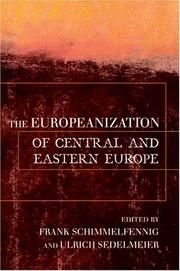| Listing 1 - 10 of 23 | << page >> |
Sort by
|

ISBN: 1280421649 0511180381 0511062761 0511204477 0511307322 0511492065 0511071221 110713837X 9780511062766 9780511071225 6610421641 9780521828062 0521828066 9786610421640 0521828066 0521535255 9780511492068 9780521535250 0521535255 Year: 2003 Publisher: Cambridge Cambridge University Press
Abstract | Keywords | Export | Availability | Bookmark
 Loading...
Loading...Choose an application
- Reference Manager
- EndNote
- RefWorks (Direct export to RefWorks)
Why did Western European states agree to the enlargement of the EU and NATO? Frank Schimmelfennig analyzes the history of the enlargement process and develops a theoretical approach of 'rhetorical action' to explain why it occurred. While rationalist theory explains the willingness of East European states to join the NATO and EU, it does not explain why member states decided to admit them. Using original data, Schimmelfennig shows that expansion to the East can be understood in terms of liberal democratic community building. Drawing on the works of Jon Elster and Erving Goffman, he demonstrates that the decision to expand was the result of rhetorical action. Candidates and their supporters used arguments based on collective identity, norms and values of the Western community to shame opponents into acquiescing to enlargement. This landmark book makes an enormous contribution to theory in international relations and to the study of European politics.
National security --- North Atlantic Treaty Organization --- Membership. --- Europe --- Economic integration. --- North Atlantic treaty organisation --- NAVO --- OTAN --- 341.2422 --- #SBIB:327.7H21 --- #SBIB:327.7H32 --- Ontwikkeling van de Europese Unie (historische en toekomstige evolutie) --- Bondgenootschappen: NAVO / NATO --- NATO --- Sécurité nationale --- Intégration économique --- International relations. Foreign policy --- Polemology --- European Union --- Economic integration --- Social Sciences --- Political Science --- National security - Europe --- Europe - Economic integration --- UNION EUROPEENNE --- VIE INTERNATIONALE --- RELATIONS EXTERIEURES --- PESC --- PESD --- POLITIQUE DE SECURITE --- ELARGISSEMENT --- ORGANISATIONS INTERGOUVERNEMENTALES
Book
ISBN: 9780198864974 0198864973 0192634194 Year: 2021 Publisher: Oxford Oxford University Press
Abstract | Keywords | Export | Availability | Bookmark
 Loading...
Loading...Choose an application
- Reference Manager
- EndNote
- RefWorks (Direct export to RefWorks)
International parliaments are on the rise. An increasing number of international organizations establishes 'international parliamentary institutions' or IPIs, which bring together members of national parliaments or - in rare cases - elected representatives of member state citizens. Yet, IPIs have generally remained powerless institutions with at best a consultative role in the decision-making process of international organizations.Why do the member states of international organizations create IPIs but do not vest them with relevant institutional powers? This study argues that neither the functional benefits of delegation nor the internalization of democratic norms answer this question convincingly. Rather, IPIs are best understood as an instrument of strategic legitimation. By establishing institutions that mimic national parliaments, governments seek to ensure that audiences at home and in the wider international environment recognize their international organizations as democratically legitimate. At the same time, they seek to avoid being effectively constrained by IPIs in international governance.The Rise of International Parliaments provides a systematic study of the establishment and empowerment of IPIs based on a novel dataset. In a statistical analysis covering the world's most relevant international organizations and a series of case studies from all major world regions, we find two varieties of international parliamentarization. International organizations with general purpose and high authority create and empower IPIs to legitimate their region-building projects domestically. Alternatively, the establishment of IPIs is induced by the international diffusion of democratic norms and prominent templates, above all that of the European Parliament.Transformations in Governance is a major academic book series from Oxford University Press. It is designed to accommodate the impressive growth of research in comparative politics, international relations, public policy, federalism, and environmental and urban studies concerned with the dispersion of authority from central states to supranational institutions, subnational governments, and public-private networks. It brings together work that advances our understanding of the organization, causes, and consequences of multilevel and complex governance. The series is selective, containing annually a small number of books of exceptionally high quality by leading and emerging scholars.The series is edited by Liesbet Hooghe and Gary Marks of the University of North Carolina, Chapel Hill, and Walter Mattli of the University of Oxford. (Provided by publisher)
Book
ISBN: 0191897418 0192634186 0192634194 Year: 2020 Publisher: Oxford, England : Oxford University Press,
Abstract | Keywords | Export | Availability | Bookmark
 Loading...
Loading...Choose an application
- Reference Manager
- EndNote
- RefWorks (Direct export to RefWorks)
This volume describes and explains the development of international parliamentary institutions and asks why international organizations establish parliamentary institutions without, however, granting them relevant decision-making powers.
International agencies --- International organization. --- Legislative bodies. --- Management. --- Federation, International --- Global governance --- Interdependence of nations --- International administration --- International federation --- Organization, International --- World federation --- World government --- World order --- World organization --- Congresses and conventions --- International relations --- Peace --- Political science --- International cooperation --- Security, International --- World politics --- Associations, International --- IGOs (Intergovernmental organizations) --- Institutions, International --- Inter-governmental organizations --- Intergovernmental organizations --- International associations --- International governmental organizations --- International institutions --- International organizations --- International unions --- Organizations, International --- Specialized agencies of the United Nations --- Interorganizational relations --- Non-state actors (International relations) --- International organization --- Bicameralism --- Legislatures --- Parliaments --- Unicameral legislatures --- Constitutional law --- Estates (Social orders) --- Representative government and representation --- Legislative bodies --- International cooperation. --- Decision making. --- Decision-making in political science
Book
Year: 2020 Publisher: Paris Cedex 12 (5, rue Roland Barthes 75598) : Groupe d'études géopolitiques,
Abstract | Keywords | Export | Availability | Bookmark
 Loading...
Loading...Choose an application
- Reference Manager
- EndNote
- RefWorks (Direct export to RefWorks)
La pandémie de Covid-19 renforce les crises d'intégration que l'Union européenne a connues au cours de la dernière décennie. Le choc asymétrique de la pandémie exacerbe les écarts existants en matière de performance économique et de santé budgétaire entre les États membres du Nord et du Sud de l'Europe et exerce de nouvelles pressions sur la cohésion de la zone euro.Les fermetures unilatérales des frontières en réaction à la propagation du virus ont perturbé l'espace Schengen, dont la cohérence avait déjà été mise à mal en 2015, par un accroissement des flux migratoires. Enfin, la pandémie a frappé pendant la phase cruciale des négociations sur les relations économiques post-Brexit entre l'Union et le Royaume-Uni. Le principe de « conditions de concurrence équitables » au cœur du marché intérieur n'est pas seulement mis à l'épreuve, mais il est également menacé par la suspension des règles de l'Union en matière d'aides d'État. Dans tous ces domaines touchés par la crise, les réformes étaient dans l'impasse avant la pandémie - la question est de savoir si le choc du Covid-19 débloquera les négociations ou réduira davantage la marge de manœuvre pour les accords à venir.Dans une Union de plus en plus hétérogène et contestée, l'intégration différenciée a considérablement facilité l'approfondissement et l'élargissement de l'intégration européenne.Elle a été particulièrement efficace pour lancer l'intégration de nouvelles politiques et l'admission de nouveaux États membres. La différenciation est toutefois moins adaptée pour relever les principaux défis actuels de l'Union européenne : la révision et la réforme des politiques hautement intégrées qui sont en crise. Pour illustrer les difficultés liées à l'intégration différenciée, cette note applique les principales connaissances théoriques et empiriques tirées d'expériences passées d'intégration différenciée, aux domaines de la politique de l'Union les plus touchés par la crise et faisant l'objet d'un besoin de réforme : la zone euro, Schengen et le Brexit.
Book
ISBN: 9780415523110 0415523117 Year: 2013 Publisher: London Routledge
Abstract | Keywords | Export | Availability | Bookmark
 Loading...
Loading...Choose an application
- Reference Manager
- EndNote
- RefWorks (Direct export to RefWorks)
EU external democracy promotion has traditionally been based on 'linkage', i.e. bottom-up support for democratic forces in third countries, and 'leverage', i.e. the top-down inducement of political elites towards democratic reforms through political conditionality. The advent of the European Neighbourhood Policy and new forms of association have introduced a new, third model of democracy promotion which rests in functional cooperation between administrations. This volume comparatively defines and assesses these three models of external democracy promotion in the EU's relations with its eastern and southern neighbours. It argues that while 'linkage' has hitherto failed to produce tangible outcomes, and the success of 'leverage' has basically been tied to an EU membership perspective, the 'governance' model of democracy promotion bears greater potential beyond the circle of candidate countries.This third approach, while not tackling the core institutions of the political system as such, but rather promoting transparency, accountability, and participation at the level of state administration, may turn out to remain the EU's most tangible form of democratic governance promotion in the future. This book was originally published as a special issue of Democratization.
Democratization. --- Démocratisation --- European Union. --- European Neighbourhood Policy (Program) --- European Union countries --- Pays de l'Union européenne --- Foreign relations --- Relations extérieures --- Democracy --- Democratization --- European Union --- #SBIB:327.7H233 --- #SBIB:324H60 --- #SBIB:324H71 --- Democratic consolidation --- Democratic transition --- Political science --- New democracies --- Europese Unie: externe relaties, buitenlands- en defensiebeleid (ook WEU) --- Politieke socialisatie --- Politieke verandering: modernisatie, democratisering, regional development --- European Neighborhood Policy (Program) --- ENP --- European Commission. --- Politique européenne de voisinage (Program) --- PEV --- Politica Europeană de Vecinătate (Program) --- European Neighbourhood Policy (Program). --- Démocratisation --- Pays de l'Union européenne --- Relations extérieures --- Democracy - European Union countries --- European Union countries - Foreign relations --- European Union countries - Foreign relations - 21st century

ISBN: 9780415420891 041542089X Year: 2007 Publisher: London : Routledge,
Abstract | Keywords | Export | Availability | Bookmark
 Loading...
Loading...Choose an application
- Reference Manager
- EndNote
- RefWorks (Direct export to RefWorks)
Book
ISBN: 9780415567503 9780415816014 0415567505 Year: 2012 Publisher: London Routledge
Abstract | Keywords | Export | Availability | Bookmark
 Loading...
Loading...Choose an application
- Reference Manager
- EndNote
- RefWorks (Direct export to RefWorks)

ISBN: 9780230019478 0230019471 9780230301276 0230301274 Year: 2011 Publisher: Basingstoke [England] New York Palgrave Macmillan
Abstract | Keywords | Export | Availability | Bookmark
 Loading...
Loading...Choose an application
- Reference Manager
- EndNote
- RefWorks (Direct export to RefWorks)
This book offers practical guidelines on the core issues of design for qualitative and quantitative research in political science.
Book
ISBN: 9780198854333 0198854331 Year: 2020 Publisher: Oxford: Oxford university press,
Abstract | Keywords | Export | Availability | Bookmark
 Loading...
Loading...Choose an application
- Reference Manager
- EndNote
- RefWorks (Direct export to RefWorks)
Differentiated integration has become a durable feature of the European Union and is a major alternative for its future development and reform. This book provides a comprehensive conceptual, theoretical, and empirical analysis of differentiation in European integration. It explains differentiation in EU treaties and legislation in general and offers specific accounts of differentiation in the recent enlargements of the EU, the Eurozone crisis, the Brexit negotiations, and the integration of non-member states. Ever Looser Union? introduces differentiated integration as a legal instrument that European governments use regularly to overcome integration deadlock in EU treaty negotiations and legislation. Differentiated integration follows two main logics. Instrumental differentiation adjusts integration to the heterogeneity of economic preferences and capacities, particularly in the context of enlargement. By contrast, constitutional differentiation accommodates concerns about national self-determination. Whereas instrumental differentiation mainly affects poorer (new) member states, constitutional differentiation offers wealthier and nationally oriented member states opt-outs from the integration of core state powers. The book shows that differentiated integration has facilitated the integration of new policies, new members, and even non-members. It has been mainly 'multi-speed' and inclusive. Most differentiations end after a few years and do not discriminate against member states permanently. Yet differentiation is less suitable for reforming established policies, managing disintegration and fostering solidarity, and the path-dependency of core state power integration may lead to permanent divides in the Union

ISBN: 080148961X 0801443342 Year: 2005 Publisher: Ithaca (N.Y.) : Cornell university press,
Abstract | Keywords | Export | Availability | Bookmark
 Loading...
Loading...Choose an application
- Reference Manager
- EndNote
- RefWorks (Direct export to RefWorks)
#SBIB:327.7H230 --- #SBIB:328H27 --- Europese Unie: beleid: algemeen --- Instellingen en beleid: Midden- en Centraal Europa: algemeen --- European Union --- E.U. --- Europe, Central --- Europe, Eastern --- Central Europe --- Economic conditions. --- Economic integration. --- Politics and government --- Economic conditions
| Listing 1 - 10 of 23 | << page >> |
Sort by
|

 Search
Search Feedback
Feedback About UniCat
About UniCat  Help
Help News
News